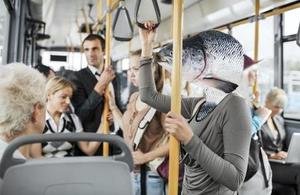World Fish Migration Day celebration comes to the North East
Environment Agency runs free event in Durham to celebrate global day

Image shows how fish can't travel like humans
Fisheries officers and ecologists from the Environment Agency are running a free event in Durham on Saturday 21 May, as part of a global campaign to raise awareness about the importance of fish migration.
Taking place on the River Wear in the centre of Durham, Cathedral to Coast is an event organised by the Environment Agency and Durham County Council, as part of World Fish Migration Day.
Visitors will be able to find out about iconic local fish species from our local expert biologists and get up close to the mini-beasts in the River Wear.
Visit new fish pass
Durham County Council will also be giving tours of the new Freemans Reach Hydropower scheme – this innovative renewable energy project has been designed with a specialist fish pass and fish counter that not only allows migrating fish to travel freely along the river, but also tells us how many salmon and sea trout are returning to the Wear to spawn.
Phil Rippon, Fisheries Specialist at the Environment Agency said:
The Environment Agency does a lot of work to help improve fish migration and we are delighted to be able to share this with the local community. Being part of a huge global event gives us a great opportunity to raise awareness about the importance of fish migration and explain what we do and why.
Day gathers momentum
Now in its second year, World Fish Migration Day has gained rapid momentum, with over 1000 organisations around the globe getting involved, and a huge range of events. There will be over 400 events in 60 countries.
Migration is important because many species of fish need to migrate to reproduce, feed and complete their life cycles. They also make up a crucial link in the food chain and play an important role in healthy river systems.
Many migratory fish species are severely threatened. The main are obstacles like dams, weirs and sluices, which disrupt the natural flow of rivers and prevent fish moving along rivers.
There are two sessions: 10am – 12 midday and 2pm – 4pm and each session is for a maximum of 25 people. Places should be booked online, via the event page.